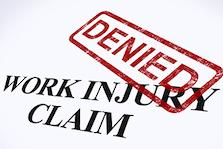What To Do After A Denied Workers’ Compensation Claim?
NO FEES UNLESS WE ARE SUCCESSFUL


If your employer’s insurance provider refused your worker compensation claim after you experienced a work-related accident, you may be able to appeal. If you have a workplace injury and seek workers’ compensation benefits, you are at a severe disadvantage. Your claim for workers’ compensation might be refused for several reasons.
At Bellotti Law Group P.C., we match injured workers with a Boston workers’ compensation lawyer who understands this complicated area of the law. For a variety of reasons, claims are refused. A denial, on the other hand, does not always imply that you are ineligible for benefits. Contact one of our experienced lawyers today to help you get the benefits you need.
How Do Workers Compensation Claims Work?
If you sustain a workplace injury, you bear the burden of proving that a workplace injury or disabling condition justifies payment of workers’ compensation benefits. These benefits are not paid by your employer. The employer is covered by workers’ compensation insurance. Your employer’s insurance company and its lawyers will go to great lengths to prevent paying a claim.
A worker who has been injured has the right to submit a workers’ compensation claim to recoup medical costs, lost income, and other benefits. Insurers may refuse to pay benefits to a worker right away or will begin paying benefits but then stop abruptly. In Massachusetts, an insurer may pay compensation to an injured worker for up to 180 days after the incident without accepting liability.
You have the opportunity to appeal the denial through the Massachusetts Department of Industrial Accidents’ four-step process (DIA). These are complicated legal processes, and having a qualified workers’ compensation lawyer on your side to assist you is crucial.
Common Reasons Worker Compensation Claims Are Denied
It’s fairly uncommon for claims for workers’ compensation to be refused. Claims are sometimes dismissed due to trivial errors. The following are the most typical grounds for workers’ compensation applications being denied:
- Deadlines that were not met – you must report your injury to your employer as soon as possible to get benefits. If you wait too long to notify your employer, your claim may be refused.
- Your health doesn’t meet state standards – workers’ compensation benefits are governed by state laws. Some claims are refused to owe to state-specific limits or the severity of the worker’s injuries.
- There’s a disagreement over whether your injury or illness was caused by your job — your employer’s insurance company may argue that your injury or sickness was not caused directly by your employment, resulting in claim denial.
- You submitted your claim after leaving your job- claims filed after an employee left, was fired, or was laid off are usually refused. However, there are several circumstances in which you may still be eligible for workers’ compensation benefits after quitting your employment. An attorney can assess your claim and determine if you are eligible for compensation.
How does the Dispute Process Work?
The following is a quick rundown of the four steps of the dispute resolution process, as well as what to expect as your case progresses.
- Conciliation: The first step in the dispute resolution process is a conciliation meeting. This takes place within 12 working days of filing your claim form with the workers’ compensation insurance provider. This meeting includes you, your attorney, an insurance company representative, and a DIA conciliator. The meeting is an attempt to achieve a voluntary arrangement between you and the insurance company.
- Conference: Your attorney and the insurance company representative make presentations to an Administrative Judge in the second stage of the dispute procedure. Our attorneys submit documents demonstrating that you were incapacitated and that the injury or illness occurred as a result of your job. The judge will either direct the insurance company to pay your benefits or signal that it is not necessary to do so after the conference.
- Hearing: A formal hearing before an Administrative Judge is the third stage of the dispute procedure. In most circumstances, the same judge from your conference will be appointed. A formal legal process in which evidence is presented and sworn testimony is taken. The judge will make a decision that will either grant or reject benefits.
- Review Board: The last stage of the dispute procedure is to appeal the hearing decision to the Industrial Accidents Review Board. This alternative is only accessible if you can demonstrate that the judge committed a legal error during the hearing or in the decision. A three-judge panel hears these cases and has the power to uphold, overturn, or remand the hearing decision to the Administrative Judge for additional consideration.
Contact Our Boston Workers Compensation Attorney
When a workers’ compensation claim is denied, you or your attorney can file a claim with the DIA to appeal your case. Workers’ compensation provides benefits for medical treatment, vocational training and rehabilitation, lost wages, wrongful death benefits, and other costs associated with the claim. In some instances, you may be entitled to a workers’ compensations settlement. To review your case and evaluate your legal options, talk with one of our experienced workers’ compensation attorneys. Get the assistance of a knowledgeable and aggressive advocate who will fight for your rights. At the Bellotti Law Group P.C. in Boston, Massachusetts our workers’ compensation lawyers will ensure you receive the maximum compensation possible. Call 617-225-2100 for a free consultation.

